Related Research Articles
Alfred Whitford (Fred) Lerdahl is the Fritz Reiner Professor Emeritus of Musical Composition at Columbia University, and a composer and music theorist best known for his work on musical grammar and cognition, rhythmic theory, pitch space, and cognitive constraints on compositional systems. He has written many orchestral and chamber works, three of which were finalists for the Pulitzer Prize for Music: Time after Time in 2001, String Quartet No. 3 in 2010, and Arches in 2011.
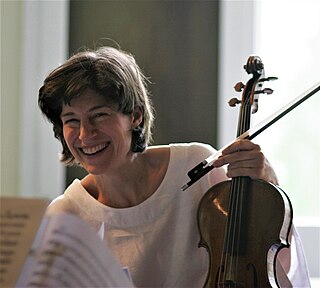
Kim Kashkashian is an American violist. She has spent her career in the U.S. and Europe and collaborated with many major contemporary composers. In 2013 she won a Grammy Award for Best Classical Instrumental Solo. She is recognized as one of the world's top violists.
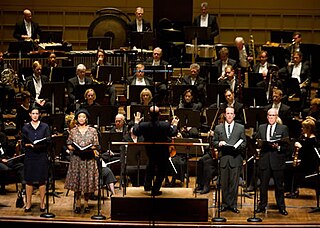
Steven Edward Stucky was a Pulitzer Prize-winning American composer.
The Del Sol Quartet is a string quartet based in San Francisco, California that was founded in 1992 by violist Charlton Lee.
Thomas Oboe Lee is a Chinese American composer.
Yehudi Wyner is an American composer, pianist, conductor and music educator.
Harold Meltzer is an American composer. Harold is inspired by a wide variety of stimuli, from architectural spaces to postmodern fairy tales and messages inscribed in fortune cookies. In Fanfare Magazine, Robert Carl commented that he "seems to write pieces of scrupulous craft and exceptional freshness, which makes each seem like an important contribution." The first recording devoted to his music, released in 2010 by Naxos on its American Classics label, was named one of the CDs of the year in The New York Times and in Fanfare; new all-Meltzer recordings will issue from Open G Records (2017), Bridge Records (2018), and BMOP/Sound (2019). A Pulitzer Prize Finalist in 2009 for his sextet Brion, Meltzer has been awarded the Rome Prize, the Barlow Prize;, a Guggenheim Fellowship, and both the Arts and Letters Award in Music and the Charles Ives Fellowship from the American Academy of Arts and Letters.
Stephen Paul Hartke is an American composer. Hartke is best known as the composer of Meanwhile – Incidental Music to Imaginary Puppet Plays, winner of the Grammy Award for Best Contemporary Classical Composition in 2013.

Nobuko Imai, is a renowned Japanese classical violist with an extensive career as soloist and chamber musician. Since 1988 she has played a 1690 Andrea Guarneri instrument.
Brett Dean is an Australian composer, violist and conductor.

Bruno Mantovani is a French composer. He has been awarded first prizes from the Conservatoire de Paris which he joined in 1993. His work has been commissioned by the French government as well as other organizations. In September 2010 he was appointed to the post of director of the Paris Conservatory.
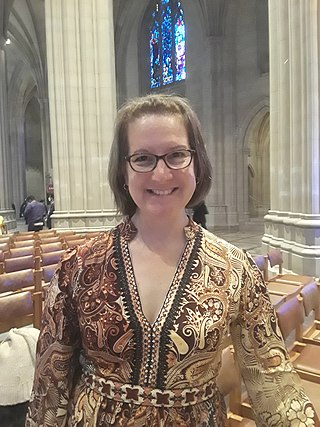
Lisa Carol Bielawa is a composer and vocalist. She is a 2009 Rome Prize winner in Musical Composition and spent a year composing as a Fellow at the American Academy in Rome.
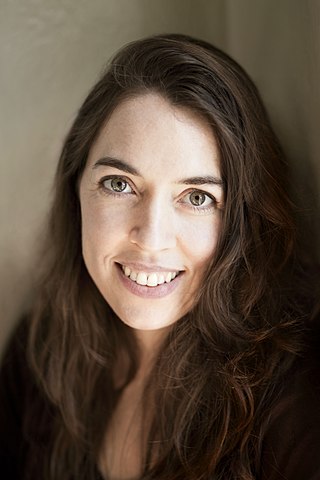
Erin Elizabeth Gee is an American composer and vocalist. Among the fellowships she has held are the Guggenheim and the Radcliffe Institute Fellowships, and among the awards she has won for her compositions are the Herb Alpert Award in the Arts, the Rome Prize and the first prize of the International Rostrum of Composers. She was on the faculty of the University of Illinois in Urbana as Assistant Professor of Composition-Theory and is currently Associate Professor of Composition at Brandeis University.
The Clarinet Quartet, also known as Quartet for Clarinet and String Trio, is a work for clarinet, violin, viola, and cello by Polish composer Krzysztof Penderecki. It was finished in 1993.

David Froom was an American composer and college professor. Froom taught at the University of Utah, the Peabody Institute, and the University of Maryland, College Park, and he was on the faculty at St. Mary's College of Maryland from 1989 until his death in 2022. He has received awards and honors from the Guggenheim Foundation, the American Academy of Arts and Letters,, the Fromm Foundation at Harvard, the Koussevitzky Foundation of the Library of Congress, the Barlow Foundation, and was a five-time recipient of an Individual Artist Award from the State of Maryland.
Sean Friar is an American composer and pianist. He currently lives in Denver, Colorado.
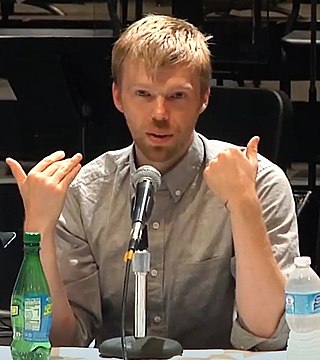
Andrew Norman is an American composer of contemporary classical music whose texturally complex music is influenced by architecture and the visual arts.

Charles Clement Fussell is an American composer and conductor of contemporary classical music. He has composed six symphonies and three operas. His symphony Wilde for solo baritone and orchestra, based on the life of Oscar Wilde and premiered by the Newton Symphony Orchestra and the baritone Sanford Sylvan in 1990, was a finalist for the 1991 Pulitzer Prize for Music. He received a citation and award from the American Academy of Arts and Letters in 1992.

Leilehua Lanzilotti, in full Anne Victoria Leilehua Lanzilotti, bynames Anne Leilehua Lanzilotti and Anne Lanzilotti,, is a Kanaka Maoli composer, sound artist, and scholar of contemporary classical music.
Chris Hung is a Hong Kong composer and teacher.
References
- ↑ "Ken Ueno". frommfoundation.fas.harvard.edu. Retrieved 2022-12-30.
- ↑ "New Faculty Profile: Composer Ken Ueno Seeks Balance, Passion" Archived 2010-06-20 at the Wayback Machine , University of California, Berkeley. Kate Rix
- ↑ Molly Sheridan (July 21, 2008). "Decoding Ken Ueno". New Music Box. Archived from the original on August 4, 2011. Retrieved July 17, 2010.
- ↑ "MINIMUM SECURITY COMPOSER/CO-DIRECTOR: KEN UENO" . Retrieved July 17, 2010.
- ↑ "PSNY: Ken Ueno Biography". www.eamdc.com. Retrieved 2022-12-31.
- ↑ "Ken Ueno | BMOP". bmop.org. Retrieved 2022-12-31.
- ↑ "Program 670: Other Minds Rewind". Other Minds. Retrieved 2022-12-31.
- ↑ "American Composers Orchestra - June 4, 1999 - Whitaker New Music Reading Sessions". Americancomposers.org. Retrieved 2010-07-20.
- ↑ "Ken Ueno & Du Yun at the Flea". Sequenza 21. May 1, 2010. Retrieved July 17, 2010.
- ↑ "Ken Ueno: Talus | BMOP". www.bmop.org. Retrieved 2020-06-07.
- ↑ Times, The New York (2015-10-07). "Classical Playlist: Conrad Tao, 'Scrapyard Exotica' and More". ArtsBeat. Retrieved 2020-06-07.
- ↑ Fonseca-Wollheim, Corinna da (2016-06-14). "Man, Can You Hear That Crazy Forest Green?". The New York Times. ISSN 0362-4331 . Retrieved 2020-06-07.
- ↑ "PSNY: Ken Ueno Biography". www.eamdc.com. Retrieved 2020-06-07.
- ↑ From Ueno's performance notes, KenUeno.com
- ↑ From Ueno's performance notes, KenUeno.com
- ↑ "Ken Ueno—". EMPAC—Experimental Media and Performing Arts Center. 12 September 2019. Retrieved 2020-06-07.
- ↑ "Berlin Prize in Music Composition Fellow - Class of Fall 2010, Class of Spring 2011". American Academy in Berlin. Archived from the original on March 4, 2016. Retrieved March 20, 2012.
- ↑ "The American Academy Names 2010 - 2011 Berlin Prize Recipients" Archived 2011-07-18 at the Wayback Machine , The American Academy in Berlin
- ↑ "Ken Ueno". Boston Music Orchestra Project. Retrieved July 17, 2010.[ permanent dead link ]
- ↑ "Ken Ueno: Talus", DRAM
- ↑ "recordings". gregory oakes. 2002-12-29. Retrieved 2010-07-20.
- ↑ "Downloads: One Minute More". Guylivingston.com. Archived from the original on 2009-12-17. Retrieved 2010-07-20.